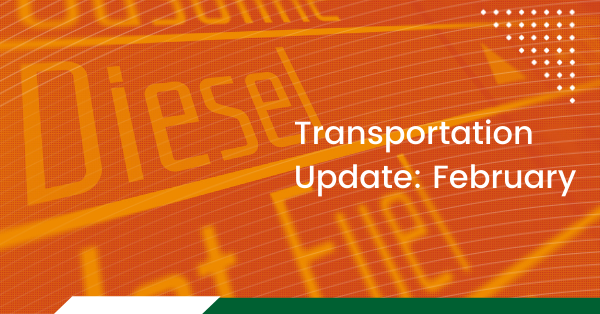We saw how vaccine mandates affected truck rates, airline transportation purchases, future supply chain predictions, and more.
Check out January’s transportation updates for the shipping industry if you missed them.
Trucking Rates, Delays Increase Amid Canada Disruptions
Canada’s new Covid-19 vaccine mandates have disrupted “just-in-time supply chain” companies involved in the Canada – U.S. trade. These disruptions led to 44 percent higher shipping rates over the last month for heavy-duty trucks. According to Truckstop.com Inc., “Prices for shipping goods from Canada to the U.S with heavy-duty trucks now cost $4.07 per mile.” While the rate for refrigerated trucks rose by a third to $4.87 per mile.”
Luckily, rates to ship goods from the U.S. to Canada did not increase as much during this time. However, truckers still saw a 20 percent increase in rates, along with fewer truck drivers available due to some choosing to stay unvaccinated, preventing truckers from crossing the border.
According to Project44, “Most businesses can accommodate these delays without major disruption due to their wide delivery windows.”
Read more here.
Supply Chain Disruptions Likely to Continue in Near Future
According to Economists and industry experts, the supply chain disruptions will continue to impact the transportation industry for the first half of the year and possibly into 2023. Carriers, shippers, and third-party logistic (3PL) providers worldwide are still trying to fix the bottleneck problem within the sector impacting their operations.
“We spent tremendous efforts in mitigating bottlenecks by expanding capacity across the ocean [freight], improving productivity in terminals and growing our global logistics footprint,” said A.P. Moller-Maersk CEO Soren Seku. “We will continue these efforts as we see the current market situation persist into the second quarter.”
Despite the supply chain’s problems, high consumer demand increases significant retailers’ sales growth and profits. As a result, major retailer chains like Amazon, Walmart, and Kroger have chosen to significantly bolster their supply chain and help reduce transit and port delays. In addition, with more companies investing in their supply chain, many are starting to work more with multiple suppliers and find technological solutions to help.
While technology has helped improve the trucking industry, there is still more information needed from suppliers, shippers, carriers and 3PLs to overcome the supply chain disruptions. According to Jim Guthrie, director of operations for Springfield, Mo.-based Prime Inc., “For technology to fully resolve supply chain issues, [we] need good information from everybody, every piece of the supply chain.”
Read more here.
Western Global Airlines orders 2 Boeing 777 freighters
On February 15th, Boeing and Airbus announced new customers for their large freighter programs.
Western Global Airlines has placed a firm order for two of Boeing’s 777 freighters. While Etihad Airways signed a letter of intent to purchase seven A350 widebody freighters, Singapore Airlines locked in a tentative order for seven A350 cargo jets.
Boeing 777 Freighters
This is the first time Western Global has purchased factory-built freighters. Previously, Western Global purchased former passenger aircraft converted to cargo configurations. The new Boeing 777 freighter can hold a maximum weight of 118 tons with a range of 4,970 nautical miles, which will allow them to have fewer stops with better fuel performance.
“We have determined that augmenting our existing fleet with new 777 freighters will enable us to serve our customers best while providing a clear path to our future fleet plans,” said founder and CEO Jim Neff.
Airbus A350 Freighters
Airbus has confirmed a total of 29 A350 freighter aircraft from five customers. According to Airbus, the A350’s are made with advanced materials, resulting in a 33-ton lighter takeoff weight and 20 percent lower fuel consumption. Airbus’s innovative design has made them a serious player in the freighter market.
According to Boeing, the global freighter fleet will grow by 70 percent over the next 20 years as supply chains continue to spread globally.
Read more here.
Diesel Tops $4 a Gallon With 6.8¢ Hike
According to the Energy Information Administration (EIA), for the first time in eight years, diesel prices reached $4, increasing fuel prices by 6.8 cents, making it $4.019 per gallon. The cost of diesel has surged over 60 cents in the past six weeks. When comparing diesel prices from last year, trucker’s primary fuel costs $1.143 more than it did currently in 2021.
According to two of the nation’s leading energy analysts, gas and diesel prices may keep increasing. With unleaded gas reaching $4.11 a gallon and diesel rising above $5.
The demand for diesel is increasing with more ships transporting goods worldwide. According to DHL Freight Forwarding, “The international container liner fleet grew 4.5 percent in 2021 as shipping prices surged worldwide, especially on the lucrative China-to-Southern California route.”
Oil analyst Phil Flynn told Transport Topics, “One of the factors driving higher diesel prices is the 11.5 percent year-over-year lower inventories for Jet A fuel, which are declining as airlines begin more flights with signs the pandemic is easing.”
Read more here.
2022 State Truck Driving Championships Schedule
On February 6th, Transport Topics announced that the State Truck Driving Championship is back! The State Truck Driving Championships is when truck drivers compete against one another in parallel parking. The schedule is out now on their website, with additional states added as they become known.
The winners from each of the nine categories advance to the National Truck Driving and Step Van Driving Championships in Indianapolis from August 16th –20th.
Check out your state’s competition dates here.

